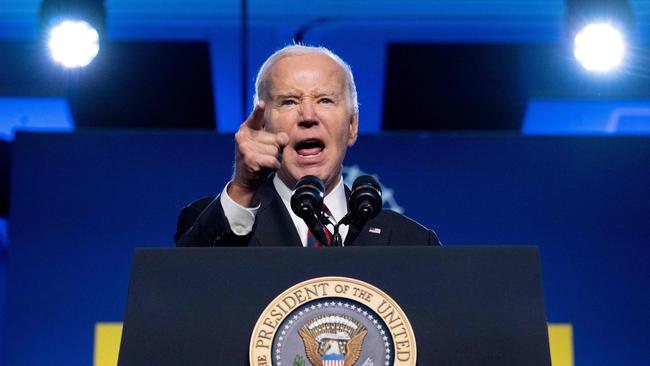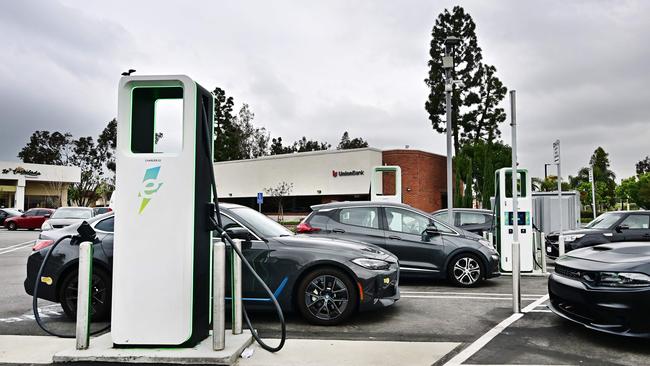Joe Biden poised to dump tough EV mandates amid sagging demand, rising costs
After promising to drastically lift electric vehicle sales the Biden administration is poised to significantly water down rules that would have compelled Americans to buy more EVs.

The Biden administration is poised to dump controversial rule that would require Americans to buy more electric cars sooner, in a nod to their declining popularity and increasing cost that will embarrass the Albanese government, which has sought to copy the US approach.
In a move that will infuriate environmentalists the US Environmental Protection Agency is reportedly going to dump proposed rules would have ensured around two thirds of sales of new cars and light trucks in the US were fully electric by 2032, up from almost 8 per cent last year.
“Instead of essentially requiring automakers to rapidly ramp up sales of electric vehicles over the next few years, the administration would give car manufacturers more time, with a sharp increase in sales not required until after 2030,” the New York Times said based on two anonymous administration sources, on Saturday (Sunday AEDT).

Last year the Albanese government said it intended to bring Australian rules in line with those of the US by 2028. Nationals Senator Matt Canavan said the United States’ plan to delay the switch to electric vehicles “blew up” the Australian government’s plans for a new carbon tax on cars.
“There is completely no justification because while the US did have future plans that looked similar to Australia’s, they don’t anymore, the Biden administration is completely backing down from that,” he told Sky News.
He added Australians would be paying more than what is necessary if the government doesn’t get it right and needed to consider how stringent the efficiency standards are, as well as how much the penalty would be in breaching those standards.
“The reason the US is watering this down would be similar reasons to ourselves, many of the vehicles the government wants to make more expensive are simply a necessity for tradesmen and women.”
The Biden administration, which has made a big show of its dedication to boosting electric cars sales to reduce climate change, has come under pressure from autoworker unions and big US car makers who fear a too rapid shift could cost jobs and profits amid a surge in the price of commodities that underpin batteries.

In September around 13,000 United Auto Workers walked off the job at General Motors, Ford and Stellantis plants in three states for better pay and conditions and to signal their concern about the mandated transition to electric vehicles, which require fewer workers and tend to be constructed in southern US states where labour laws are less strict.
The union only endorsed Joe Biden for president last month, prompting speculation a relaxation of EV rules could have been a quid pro quo.
At the end of last year around 3,900 car dealers wrote to President Biden to warn his EV mandates were unworkable, pointing to an influx of electric cars that were “stacking up on our lots”.
“Electric vehicle demand today is not keeping up with the large influx of BEVs arriving at our dealerships prompted by the current regulations,” they said.
Sales of Ford’s F-150 Lightning, the electric version of its best selling truck, fell fast short the company’s hopes in 2023, selling around 24,000 compared to forecasts of 150,000 sales.
As president Donald Trump scrapped federal tail pipe emission rules, prompting around 17 states to benchmark their own rules to California, which maintains even stricter rules on electric vehicle roll out including a mandate for 35 per cent of all new car sales to be electric by 2026.
EV sales rose 46 per cent to around one million units in 2023 to make up around 7 per cent of the US market last year, according to Associate Press.








To join the conversation, please log in. Don't have an account? Register
Join the conversation, you are commenting as Logout